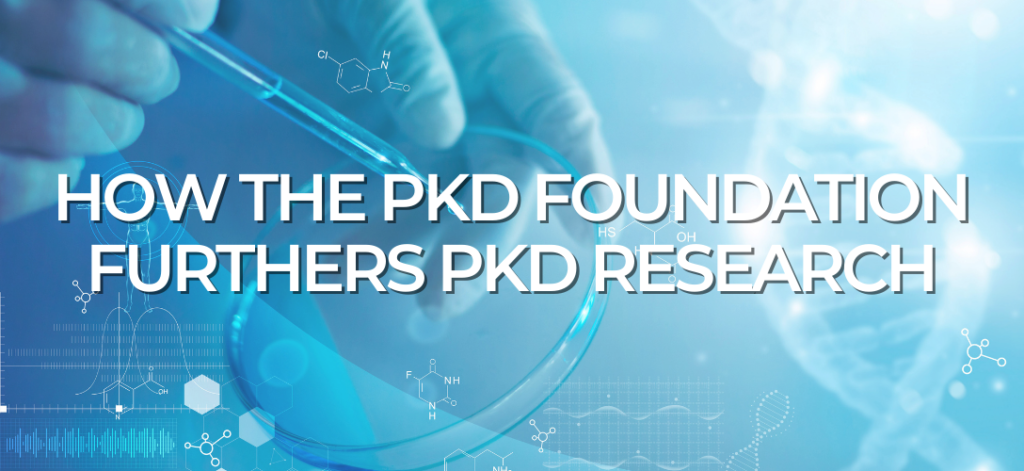
Published on June 8, 2021 | At the PKD Foundation, creating a world free of PKD is our ultimate goal. In order to make that goal a reality, more PKD research is needed. Over the past 40 years, we’ve evolved from not only a funder, but a doer of research. Let’s dive into the many ways the PKD Foundation helps further PKD research.
PKD Research Grants and Fellowships
Since 1982, we’ve proudly funded more than $50 million in PKD research and leveraged $1.5 billion in government funding. Our grant and fellowship program improves disease understanding to drive new treatments. In 2021, we awarded new research funding to 11 outstanding PKD researchers.
Federal grant programs require substantial preliminary data prior to funding. As the largest private funder of early-stage PKD science, we set researchers up for future funding and advanced discoveries in PKD research. With our 2014-2019 research grantees, 51% went on to receive NIH funding. Plus, they’re outperforming peers in competing for NIH funds.
PKD Foundation and PKDOC
The PKD Outcomes Consortium (PKDOC) is a collaboration between the PKD Foundation, Critical Path Institute, representatives of the pharmaceutical industry, PKD clinicians, and the U.S. Food and Drug Administration. PKDOC was created to provide a pathway for bringing treatments to patients faster, and successfully qualified total kidney volume (TKV) as a biomarker to select patients for clinical studies, which has facilitated the majority of clinical studies for ADPKD treatments.
ADPKD is marked by a long period of stable kidney function (as measured by the currently accepted endpoints in drug development) during which the kidneys expand enormously due to cyst growth. Traditional endpoints of renal function only show changes very late in the course of the disease. This makes it difficult to assess the effectiveness of new medications. There’s a critical need for additional biomarkers that will judge disease progression at an earlier stage before patients have incurred serious, irreversible damage and when they may be more likely to respond to new therapies.
Additionally, there are no agreed upon clinical outcomes upon which the FDA would approve a drug for the treatment of ARPKD or accepted biomarkers that scientists could use to understand if a potential ARPKD therapy is impacting progression of disease in patients. Both diseases are in need of the accelerated research collaborations that make up PKDOC’s mission.
Without PKDOC, we wouldn’t have the PKD Treatment Pipeline. This pipeline tracks the various PKD treatments in clinical trials from discovery through Phase 3. On this page, you’ll see details on each treatment in development and their clinical study status.
PKD Research and PKDOC Summit
In May 2021, PKDOC hosted an international Regulatory Summit with key stakeholders from the pharmaceutical industry and academic setting, foundations, patient advocacy groups, individuals living with PKD, and regulatory agencies from around the world. Together, they engaged in collaborative panel discussions to identify unmet needs and potential approaches to accelerate drug development for ARPKD, approaches to expand ADPKD treatments to patients earlier in disease progression, and tools and approaches to expedite the ADPKD treatment pipeline
The PKDF believes this summit has catalyzed the development of goals and working groups to drive the priorities of PKDOC for the next 5-10 years.
Furthering PKD Research through ADPKD Registry
When it comes to PKD research, understand the experience and needs of those affected by the disease is essential. And so the ADPKD Registry was born. The Registry is the first nationwide database of patients with ADPKD. By joining the Registry, patients have the power to drive the next medical breakthrough. Because it works directly with patients, research has a 100% probability of impact.
It’s estimated that more than 600,000 Americans have ADPKD. To date, nearly 2,000 participants have signed up for the Registry. As more patients join the Registry, the ability to improve patient outcomes only grows.









I am a pkd kidney transplant recipient and previously a dialysis patient for 6years. when I look back 20 yrs. dealing with PKD, I have not seen any real news directed at prevention.
It is sad because a lot of people suffer through dialysis for years. Then transplant ,which is life saving but still carries a lot of precautions and other health risks as a result of the suppressed immunity.
I always think that the focus should be on stopping the mutation of the gene that causes pkd. I see studies that go the way of prevention vs. slowing down . I know that lots of very bright researchers know better.
But I wonder, is any of the research going in the direction of prevention.?
I got this web site from my pal who shared with me about this web site
and now this time I am visiting this web page and reading very informative content here.